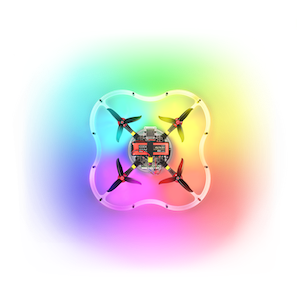Code examples
Python
#
Function to fly to a point and wait for copter's arrival:
import math
def navigate_wait(x=0, y=0, z=0, yaw=float('nan'), speed=0.5, frame_id='', auto_arm=False, tolerance=0.2):
navigate(x=x, y=y, z=z, yaw=yaw, speed=speed, frame_id=frame_id, auto_arm=auto_arm)
while not rospy.is_shutdown():
telem = get_telemetry(frame_id='navigate_target')
if math.sqrt(telem.x ** 2 + telem.y ** 2 + telem.z ** 2) < tolerance:
break
rospy.sleep(0.2)
This function utilizes navigate_target frame for computing the distance to the target.
Using the function for flying to the point x=3, y=2, z=1 in marker's map:
navigate_wait(x=3, y=2, z=1, frame_id='aruco_map')
This function can be used for taking off as well:
navigate_wait(z=1, frame_id='body', auto_arm=True)
#
Land and wait until the copter lands:
land()
while get_telemetry().armed:
rospy.sleep(0.2)
Usage:
land_wait()
#
Wait for copter's arrival to the navigate target:
import math
def wait_arrival(tolerance=0.2):
while not rospy.is_shutdown():
telem = get_telemetry(frame_id='navigate_target')
if math.sqrt(telem.x ** 2 + telem.y ** 2 + telem.z ** 2) < tolerance:
break
rospy.sleep(0.2)
#
Calculate the distance between two points (important: the points are to be in the same coordinate system):
import math
def get_distance(x1, y1, z1, x2, y2, z2):
return math.sqrt((x1 - x2) ** 2 + (y1 - y2) ** 2 + (z1 - z2) ** 2)
#
Approximation of distance (in meters) between two global coordinates (latitude/longitude):
import math
def get_distance_global(lat1, lon1, lat2, lon2):
return math.hypot(lat1 - lat2, lon1 - lon2) * 1.113195e5
#
Disarm the drone (propellers will stop, the drone will fall down):
# Declaring a proxy:
from mavros_msgs.srv import CommandBool
arming = rospy.ServiceProxy('mavros/cmd/arming', CommandBool)
# ...
arming(False) # disarm
#
Transform the position (PoseStamped) from one coordinate system to another using tf2:
import tf2_ros
import tf2_geometry_msgs
from geometry_msgs.msg import PoseStamped
tf_buffer = tf2_ros.Buffer()
tf_listener = tf2_ros.TransformListener(tf_buffer)
# ...
# Create PoseStamped object (or get it from a topic):
pose = PoseStamped()
pose.header.frame_id = 'map' # coordinate frame, in which the position is specified
pose.header.stamp = rospy.get_rostime() # the time for which the position is specified (current time)
pose.pose.position.x = 1
pose.pose.position.y = 2
pose.pose.position.z = 3
pose.pose.orientation.w = 1
frame_id = 'base_link' # target coordinate frame
transform_timeout = rospy.Duration(0.2) # timeout for transformation
# Transform the position from the old frame to the new one:
new_pose = tf_buffer.transform(pose, frame_id, transform_timeout)
#
Determine whether the copter is turned upside-down:
PI_2 = math.pi / 2
telem = get_telemetry()
flipped = abs(telem.pitch) > PI_2 or abs(telem.roll) > PI_2
#
Calculate the copter horizontal angle:
PI_2 = math.pi / 2
telem = get_telemetry()
flipped = not -PI_2 <= telem.pitch <= PI_2 or not -PI_2 <= telem.roll <= PI_2
angle_to_horizon = math.atan(math.hypot(math.tan(telem.pitch), math.tan(telem.roll)))
if flipped:
angle_to_horizon = math.pi - angle_to_horizon
#
Fly along a circular path:
RADIUS = 0.6 # m
SPEED = 0.3 # rad / s
start = get_telemetry()
start_stamp = rospy.get_rostime()
r = rospy.Rate(10)
while not rospy.is_shutdown():
angle = (rospy.get_rostime() - start_stamp).to_sec() * SPEED
x = start.x + math.sin(angle) * RADIUS
y = start.y + math.cos(angle) * RADIUS
set_position(x=x, y=y, z=start.z)
r.sleep()
#
Repeat an action at a frequency of 10 Hz:
r = rospy.Rate(10)
while not rospy.is_shutdown():
# Do anything
r.sleep()
#
An example of subscription to a topic from MAVROS:
from geometry_msgs.msg import PoseStamped, TwistStamped
from sensor_msgs.msg import BatteryState
from mavros_msgs.msg import RCIn
def pose_update(pose):
# Processing new data of copter's position
pass
rospy.Subscriber('/mavros/local_position/pose', PoseStamped, pose_update)
rospy.Subscriber('/mavros/local_position/velocity', TwistStamped, velocity_update)
rospy.Subscriber('/mavros/battery', BatteryState, battery_update)
rospy.Subscriber('mavros/rc/in', RCIn, rc_callback)
rospy.spin()
Information about MAVROS topics is available at the link.
#
Send an arbitrary MAVLink message to the copter:
from mavros_msgs.msg import Mavlink
from mavros import mavlink
from pymavlink import mavutil
mavlink_pub = rospy.Publisher('mavlink/to', Mavlink, queue_size=1)
# Sending a HEARTBEAT message:
msg = mavutil.mavlink.MAVLink_heartbeat_message(mavutil.mavlink.MAV_TYPE_GCS, 0, 0, 0, 0, 0)
msg.pack(mavutil.mavlink.MAVLink('', 2, 1))
ros_msg = mavlink.convert_to_rosmsg(msg)
mavlink_pub.publish(ros_msg)
#
React to the drone's mode switching (may be used for starting an autonomous flight, see example):
from mavros_msgs.msg import RCIn
# Called when new data is received from the transmitter
def rc_callback(data):
# React on toggling the mode of the transmitter
if data.channels[5] < 1100:
# ...
pass
elif data.channels[5] > 1900:
# ...
pass
else:
# ...
pass
# Creating a subscriber for the topic with the data from the transmitter
rospy.Subscriber('mavros/rc/in', RCIn, rc_callback)
rospy.spin()
#
Change the flight mode to arbitrary one:
from mavros_msgs.srv import SetMode
set_mode = rospy.ServiceProxy('mavros/set_mode', SetMode)
# ...
set_mode(custom_mode='STABILIZED')
#
Flip:
import math
PI_2 = math.pi / 2
def flip():
start = get_telemetry() # memorize starting position
set_rates(thrust=1) # bump up
rospy.sleep(0.2)
set_rates(pitch_rate=30, thrust=0.2) # pitch flip
# set_rates(roll_rate=30, thrust=0.2) # roll flip
while True:
telem = get_telemetry()
flipped = abs(telem.pitch) > PI_2 or abs(telem.roll) > PI_2
if flipped:
break
rospy.loginfo('finish flip')
set_position(x=start.x, y=start.y, z=start.z, yaw=start.yaw) # finish flip
print(navigate(z=2, speed=1, frame_id='body', auto_arm=True)) # take off
rospy.sleep(10)
rospy.loginfo('flip')
flip()
Requires the special PX4 firmware for Clover. Before running a flip, take all necessary safety precautions.
#
Perform gyro calibration:
from pymavlink import mavutil
from mavros_msgs.srv import CommandLong
from mavros_msgs.msg import State
send_command = rospy.ServiceProxy('/mavros/cmd/command', CommandLong)
def calibrate_gyro():
rospy.loginfo('Calibrate gyro')
if not send_command(command=mavutil.mavlink.MAV_CMD_PREFLIGHT_CALIBRATION, param1=1).success:
return False
calibrating = False
while not rospy.is_shutdown():
state = rospy.wait_for_message('mavros/state', State)
if state.system_status == mavutil.mavlink.MAV_STATE_CALIBRATING or state.system_status == mavutil.mavlink.MAV_STATE_UNINIT:
calibrating = True
elif calibrating and state.system_status == mavutil.mavlink.MAV_STATE_STANDBY:
rospy.loginfo('Calibrating finished')
return True
calibrate_gyro()
TIP
In process of calibration the drone should not be moved.
#
Enable and disable ArUco markers recognition dynamically (for example, for saving CPU resources):
import rospy
import dynamic_reconfigure.client
client = dynamic_reconfigure.client.Client('aruco_detect')
# Turn markers recognition off
client.update_configuration({'enabled': False})
rospy.sleep(5)
# Turn markers recognition on
client.update_configuration({'enabled': True})
#
Wait for global position to appear (finishing GPS receiver initialization):
import math
while not rospy.is_shutdown():
if math.isfinite(get_telemetry().lat):
break
rospy.sleep(0.2)
#
Read flight controller's parameter:
from mavros_msgs.srv import ParamGet
from mavros_msgs.msg import ParamValue
param_get = rospy.ServiceProxy('mavros/param/get', ParamGet)
# Read parameter of type INT
value = param_get(param_id='COM_FLTMODE1').value.integer
# Read parameter of type FLOAT
value = param_get(param_id='MPC_Z_P').value.float
#
Set flight controller's parameter:
from mavros_msgs.srv import ParamSet
from mavros_msgs.msg import ParamValue
param_set = rospy.ServiceProxy('mavros/param/set', ParamSet)
# Set parameter of type INT:
param_set(param_id='COM_FLTMODE1', value=ParamValue(integer=8))
# Set parameter of type FLOAT:
param_set(param_id='MPC_Z_P', value=ParamValue(real=1.5))
